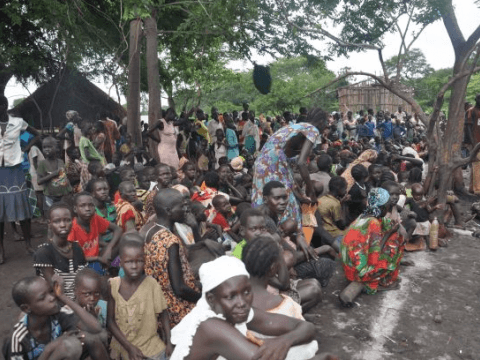Helping refugees in Ethiopia

Ethiopia has continued to be a refugee-safe destination for many neighboring countries, particularly hosting refugees from South Sudan, Somalia, Eritrea, the Sudan and many other African countries since the 1960s.
However, recently UN agencies, the Administration for Refugees and Returnees Affairs (ARRA) of Ethiopia and NGOs are struggling to provide emergency relief to more than 145,000 refugees who began to arrive in Ethiopia through Gambela Regional State since the outbreak of the conflict in South Sudan which started in late December 2013.
The refugees, of which more than 70% are women and children according to UNHCR, arrive in Ethiopia mainly through Pagak, Burubeiy and Akobo border entry points after ten days of walking without sufficient food and water. Even though transportation of refugees from the border to the different camps is carried out by IOM, and high energy biscuits are being provided by WFP, there remain thousands of refugees at entry points waiting for their turn to be transported to camps. Lack of sufficient funding coupled with the rainy season and poor road conditions has made transportation difficult to some of the entry points and has left many highly vulnerable women and children struggling to survive as they await transport to a camp setting.
OUT OF THE REQUESTED US$102 MILLION, ONLY 22% HAS BEEN FUNDED, LEAVING A 78% FUNDING GAP (UNHCR).
Everyone in the refugee camps has a story of suffering and loss. Many could describe how they lost a family member or a friend; how they were separated from their parents; the horrors of the fighting, etc. The refugees are exhausted and desperately hoping for a better day.
Nyakaka Dudwan is one of the women waiting for shelter, which in essence is a temporary tent. Nyakaka, who is expecting her first baby any time, was exhausted after walking for 10 days. Sitting in one of the tents of a relative, she talked about her situation. "If conflict threatened your life, what would you do? I don’t know how I made it, but almost can’t feel my legs now. I had to walk for long hours for ten days and now all I can do is sit here and go through the pictures I have, which takes me back to better days back home. I have no idea if my husband is still alive or not. I am scared for myself as well as for my baby and I just hope for a better day to come."
But hope is tenuous for the South Sudanese refugees in Gambela.
In particular children have been highly affected by the South Sudanese conflict, facing serious challenges associated with malnutrition, disease, physical injuries, grief and loss. The future, in which children had dreams of becoming a doctor, a teacher or an engineer now lies in tatters. Lack of sufficient child friendly spaces and education has left children wandering the camps with little to do. “I miss being in school,” is the common response from the children who had little else to do but play with mud in the refugee camps.
Mid –Upper Arm Circumference (MUAC) screening results among the new arrivals in Burubeiy indicate Global Acute Malnutrition (GAM) of 25.12%, MAM of 18.8% and Severe Malnutrition (SAM) of 7.04%. UNHCR reported that a further 25.3% of the total number of children under 5 that were screened were deemed to be at risk of malnutrition.
There are a number of unaccompanied minors among the refugees. Some have to search for their siblings day in and day out.
Neded is eight years old, she looks after her brother who is six. They have no idea where their parents are. “We just walked among other refugees, and arrived here after 12 tiresome days. We don’t know whether they are alive or not. I wish at least we had either of them. We are staying in one of the tents with some other refugees. I cook and look after my brother,” said Neded with a sad look in her eyes.
World Vision Ethiopia has begun implementation of WASH activities to ensure there is a permanent water source for residents of the Kule II camp in Gambela. Some of the daily laborers are refugees.
Makuach (middle), is one of the refuges working on the drilling team for the boreholes. “It’s been 10 days since I came to Gambela, I came here with my mother and sister, but I lost my brother in the fighting. Everything is destroyed back home. We have nothing left there."
These are ordinary people facing extraordinary struggles. World Vision calls upon donors and humanitarian actors to increase efforts to provide urgent and coordinated support to the increased needs of refugees, including a special focus on the urgent needs of children.
Share